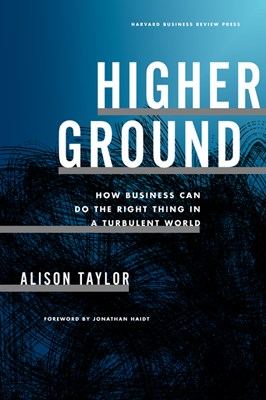Leadership Tips for When the Ground Is Shifting
February 07, 2024
Alison Taylor writes that being an exceptional leader doesn't require pleasing everyone all the time. Instead, what matters most is treating workers, customers, suppliers, and investors with honesty, dignity, and respect.
In responsible business, the perfect is truly the enemy of the good.
Consider Yvon Chouinard’s announcement in September 2022 that he would transfer the ownership of Patagonia Inc., which he’d founded in 1973, to a nonprofit trust. The media responded with initial enthusiasm to the eighty-three-year-old eco-entrepreneur’s declaration that “Earth is our only shareholder. Instead of ‘going public,’ you could say we are ‘going purpose.’”
But within days, commentators were noting that the underlying business model would still rely on plastic, the deal’s structure would facilitate tax avoidance, and Patagonia’s employees would get no stake.
Even turning your profoundly successful company into a charity won’t suspend society’s “gotcha” mindset for long. In a feverish atmosphere where polarization and misinformation flourish, there is no reliable way to avoid criticism, please all stakeholders, and manage reputational risk.
When the ground is shifting, neither higher walls nor a faster pace will help. It’s time to seek firmer footing.
So how can you find higher ground?
Your purpose should be specific and grounded in your impact on the world. The reason your business exists can be as simple as to offer a good product or service that people want to buy. But let’s be clear: you need to make your best effort to clean up any messes you make and to treat workers, customers, suppliers, and investors with honesty, dignity, and respect. With these fundamental commitments in place, your efforts will be firmly grounded.
Before promising to make the world better, do your very best to make your business better. Be focused and honest about how and where you seek to address your impacts and be mindful of the likely limitations of your efforts.
Respect the systems we all depend on. Your company isn’t a self-contained, self-serving entity with a singular consciousness and agenda. It’s an open social system that is highly complex. It influences and is influenced by wider social, political, and environmental systems. You should proceed with an awareness that unintended consequences loom when you seek to shape these external systems for your own ends, even with the best intentions.
You can’t please all the people all of the time. You won’t build stakeholder trust by managing reputational risk. At the same time, your obligations aren’t limitless. It’s not your job to respond apologetically to every stakeholder demand, critique, or hashtag campaign. Focus closely on your real-world impact. Never solicit a stakeholder’s opinion if you have no intention of making changes in response. You can achieve more via cooperation than competition.
Basing your values on respect for human rights can bring conceptual discipline and prevent overreach. In this globalized, pluralistic world, values are constantly contested and contentious. Observing human rights principles won’t solve all challenges or guarantee that you’ll avoid controversy—far from it. But these principles are grounded in a body of international law and in dynamic thinking about the role of business, the function of government, and respect for individual rights and values. Making a meaningful commitment to honor human rights—backed by concrete effort—is incomparably more robust than issuing bland statements about integrity or trying to placate a cacophony of stakeholder voices.
This isn’t about telling an appealing story. Pressure to be more transparent and open is potent and won’t go away. Curated impression management is ever less effective. Time has run out for glossy brochures that hype the wonderful things you’re doing. Genuinely ambitious, honest disclosure is still rare enough to be refreshing. Admitting to imperfection is less dangerous than you’ve been told; it can even bring competitive advantage and help drive fresh norms across entire sectors.
Culture is a source of strategic advantage. As value becomes more intangible and organizational boundaries dissolve, corporate culture is transforming. Being dynamic, culture can be measured and improved with rigorous research. Bear in mind that no one knows all the answers in this new environment. Curiosity, humility, and experimentation offer the best paths to success.
Leadership isn’t about barking orders from the top. What we want and expect from leaders is changing radically. Governance for the 2020s means bringing in more voices to shape decisions—and building in checks and balances from above and below. Meeting inclusion imperatives isn’t about ticking social identity boxes; your business will benefit from considering the full range of perspectives before important decisions are made.
If you offer to listen—or choose to speak—you’ll need to act. Speaking up is a transformational process that’s becoming more salient. Employee voice is an asset; it can help you identify and address organizational blind spots. But while you should invite participation in shaping priorities, values, and culture, you needn’t open every decision to a democratic vote. Secure psychological safety for everyone, not just those who agree with your stances. Consider promoting people who display critical thinking and respect for the values of others.
You cannot impose meaning. You must work to create it. Involve your employees in shaping your organization’s purpose and culture, and get clear about its role in society, its values, and how it creates value. Proclaiming an inspirational purpose is no substitute for instilling a culture of respect and inclusion, a sense of agency, and a commitment to personal dignity.
You can reach higher ground. Today, being a good business doesn’t call for exaggeration, spin, or overreach. It’s not about setting rules, pitching an appealing story, or listing your achievements. The time-honored approaches have lost potency. They’re losing their grip. You’ll need to imagine and then establish firm foundations in order to aim high.
Ascending tough terrain always requires focus, courage, and stamina. A company can neither separate from society nor solve every societal challenge it encounters. Shaping a better business will require that you exercise practical curiosity over your impacts on the world, muster your energy, respect your inherent limitations, and then help the vital systems you rely on to function better. Let’s get started!
Adapted from Higher Ground: How Business Can Do the Right Thing in a Turbulent World by Alison Taylor. Copyright © 2023 by Alison Taylor. All rights reserved.



